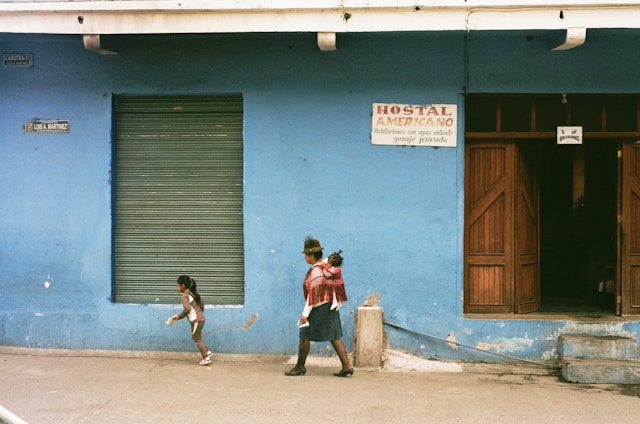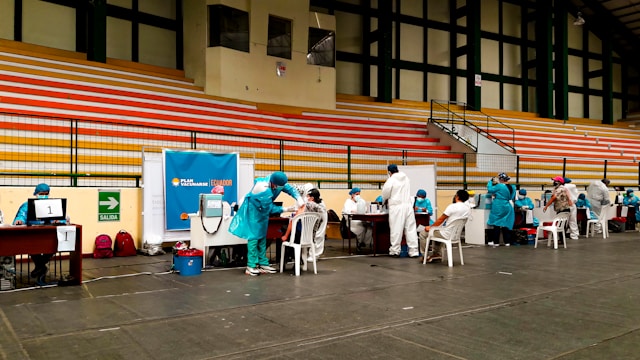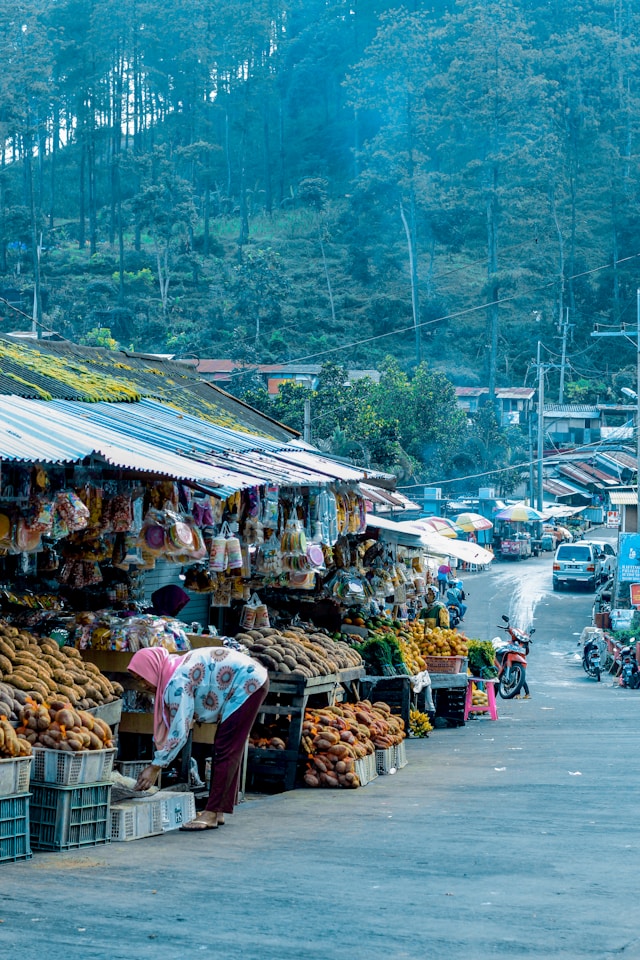Blog
Research in focus – country profiles: Indonesia and Ecuador
Our Institute’s expansive international research contributions, consisting of over 800 WIDER Working Papers in the 2019–23 work programme, delve deep into the development challenges the world faces. In the following country profiles, we pivot our focus towards Ecuador and Indonesia, serving as examples of our unique collaborative approach to development.
Utilizing our vast network of researchers, policymakers, and institutions, we not only assess pressing development issues, but actively work with partners to find solutions and make recommendations. These profiles depict the current economic outlook of these countries, while also showcasing how our researchers address research gaps and provide evidence for policymakers for inclusive and equitable development.
Ecuador – a case of economic resilience and challenges
Latin America
According to the World Bank, Ecuador’s economic outlook reveals encouraging post-pandemic recovery prospects, but also acknowledges structural weaknesses, such as oil dependency and macroeconomic vulnerabilities. Recently, the economy faced a slowdown due to increased insecurity, organized crime, and political uncertainty, necessitating an even greater urgent need for a solid evidence base to inform inclusive, sustainable development strategies.
UNU-WIDER’s contributions and innovations through ECUAMOD
Between 2019 and 2023, UNU-WIDER published an array of research outputs on Ecuador—each delving into different facets of the country’s economy. These papers contribute to the global discourse on economic inequality, social protection, and the nuanced relationship between government policies and economic outcomes. They additionally reflect the broader collaboration with partners in Ecuador that resulted in ECUAMOD in 2016, a tax-benefit microsimulation model for Ecuador, part of the larger family of similar models in the SOUTHMOD project.
 UNU-WIDER’s research related to Ecuador’s economic problems includes studies on inequality, the labour market effects of conditional cash transfers, poverty and informality, the role of universal pensions, tax-benefit microsimulation, and potential redistributive effects of various policies, gender disparities in top incomes, the impact of COVID-19 on the income distribution, tax avoidance, and challenges in the informal sector. These studies provide insights for addressing structural economic issues, enhancing social protection, and formulating policies for equitable growth and expanded formal employment.
UNU-WIDER’s research related to Ecuador’s economic problems includes studies on inequality, the labour market effects of conditional cash transfers, poverty and informality, the role of universal pensions, tax-benefit microsimulation, and potential redistributive effects of various policies, gender disparities in top incomes, the impact of COVID-19 on the income distribution, tax avoidance, and challenges in the informal sector. These studies provide insights for addressing structural economic issues, enhancing social protection, and formulating policies for equitable growth and expanded formal employment.
Amid Ecuador’s economic tribulations and the pandemic, UNU-WIDER’s research has been pivotal in providing clarity and evidence to policymakers. Crucial to this research output is ECUAMOD, our tax-benefit microsimulation model which aids policy decisions on tax reforms and new benefits. With this tool, our research in Ecuador explored income redistribution, the formal employment dilemma, and the dynamics of social protection during the COVID-19 pandemic.
When Ecuador grappled with economic issues exacerbated by efforts to contain the COVID-19 pandemic, UNU-WIDER researchers provided support. With ECUAMOD, they forecast the potential impact policies and benefits would have on household incomes, state revenue, and economic output, among other outcomes.
For instance, a study by Jara and Varela (2019) harnessed microsimulation techniques to evaluate direct taxes, shedding light on their distinct advantages in assessing potential tax and benefit reforms. Their research underscored the pressing need to bolster fiscal capacity, a key element in strengthening social protection programmes and addressing the socioeconomic challenges worsened by the pandemic. 
Bargain et al. (2023) utilize administrative data to examine top earners during the pandemic, suggesting social protection policies were inadequate to mitigate income disparities and inequality. Jara and Rodriguez (2019) measure the financial hurdles to formal employment, shedding light on Ecuador's enduring battle with labour market informality—a situation aggravated by the pandemic—and highlighting the difficult balance between enhancing tax revenue and fostering formal employment incentives.
Jara and Rattenhuber (2022) focus on the female labor supply within informal employment, using microsimulation techniques on household survey data to analyse the how women choose between formal and informal work, revealing nuanced behavioural responses to tax-benefit policies. Oliva et al. (2021) explores the gender gap in top incomes, emphasizing the need to understand inequalities in the formal labour market even at the top of the income distribution, and assess the role of taxes and benefits in reducing gender income disparities.
In this context, UNU-WIDER’s contributions and research initiatives play an indispensable role in Ecuador’s journey towards addressing the economic repercussions of the pandemic while striving to reduce inequality and enhance social protection measures. These studies demonstrate the utility of microsimulation techniques for policy evaluation and highlight the need for tax and benefit reforms to enhance social protection and improve fiscal capacity.
Overcoming hurdles
Conducting research in Ecuador poses challenges, particularly in data collection during the COVID-19 pandemic. According to Xavier Jara, who is UNU-WIDER’s primary research collaborator for all Latin American SOUTHMOD models, these difficulties arose during the study by Jara et al. (2022), ‘The role of automatic stabilizers and emergency tax–benefit policies during the COVID-19 Pandemic’:
Analysing the living conditions of households during the pandemic was extremely challenging as data collection of official surveys was disrupted and phone surveys replaced face-to-face interviews. This study was the first to apply nowcasting techniques [econometric methods used to identify changes in socio-economic indicators] combined with microsimulation techniques to assess the distributional effects of the COVID-19 pandemic in the Global South.
 He adds that the study had both methodological innovation and implications for policy reforms, explaining that the study recommends rethinking social protection strategies, noting that many benefits in low- and middle-income countries do not effectively act as automatic stabilizers.
He adds that the study had both methodological innovation and implications for policy reforms, explaining that the study recommends rethinking social protection strategies, noting that many benefits in low- and middle-income countries do not effectively act as automatic stabilizers.
There are many reasons that contribute to this lack of efficacy of social protection measures to help stabilize economies in the Global South, including the limited fiscal capacity of these countries, the prevalence of informal employment (preventing adequate coverage for workers), and an overall weaker social protection system.
The study analyses changes in household income, poverty, and inequality, revealing significant increases in poverty and inequality due to the pandemic. The findings advocate for enhancing social protection and rethinking fiscal strategies to better support vulnerable populations during crises, pointing out the importance of building fiscal capacity for sustainable social policies.
Linking research to development challenges
The research questions in Ecuador were intricately linked to the country’s development challenges, including high levels of income inequality and poverty, and the prevalence of informal employment. The studies contributed to an improved understanding of equity and efficiency in the design of tax-benefit policies, providing valuable insights for policymakers aiming to achieve redistribution and poverty reduction in Ecuador.
Indonesia – navigating sustainable development
Southeast Asia
Economic context and challenges
According to the World Bank, Indonesia’s economic outlook is marked by significant growth and poverty reduction achievements since the late 1990s. It has become the largest economy in Southeast Asia and has made strides in reducing poverty and stunting rates—defined by the World Health Organization as ‘the impaired growth and development that children experience from poor nutrition, repeated infection, and inadequate psychosocial stimulation’.
The COVID-19 pandemic has, however, impacted its economy and reversed some gains in poverty reduction, necessitating a focus on recovery and sustainable growth. Challenges include adapting to changing global conditions, enhancing human capital, and addressing climate vulnerabilities.
UNU-WIDER’s impact through specialization and focus
 UNU-WIDER’s research in Indonesia spans 14 studies and 30 authors. These papers contribute to a nuanced sketch of Indonesia’s economic and social landscape, but, according to Maria C. Lo Bue, author of several of UNU-WIDER’s Indonesia papers, this work largely operates from two central questions regarding Indonesia’s development challenges:
UNU-WIDER’s research in Indonesia spans 14 studies and 30 authors. These papers contribute to a nuanced sketch of Indonesia’s economic and social landscape, but, according to Maria C. Lo Bue, author of several of UNU-WIDER’s Indonesia papers, this work largely operates from two central questions regarding Indonesia’s development challenges:
- To what extent has economic growth benefited the poor?
- How can we address the challenge of improving Indonesia’s human capital?
This specialization is just one strategy that UNU-WIDER utilizes to ensure that our research outputs can contribute to bettering our economic understanding in each context. Our research in Indonesia covers topics like deindustrialization, poverty dynamics, educational quality, labour migration, informal work, structural transformation, pro-poor growth, and the role of state capitalism, providing insights into policies for inclusive growth and development.
Economic growth and its impact on the poor
How can we ensure that economic growth lifts an entire society rather than only those at the top? While this issue has been debated for decades, dating back to Kuznets, a comparative study by Lo Bue and Palmisano (2020) on growth spells in Indonesia reveals a nuanced reality. While the 1990s witnessed significant poverty reduction among the initially poorer population, in subsequent periods, growth was less pro-poor—defined as economic growth that leads to significant benefits for the poor. This suggests that the benefits of growth have not been evenly distributed, with certain segments of society reaping more rewards than others.
The role of state capitalism, as explored by Kim and Sumner, offers insights into how government-owned enterprises have influenced this unequal distribution. Their findings suggest that while these entities can play a role in stimulating structural transformation, their impact on reducing inequality and ensuring inclusive growth is complex and multifaceted.
Furthermore, the labour market dynamics, including the livelihood of informal workers as studied by Mayang Rizky, Daniel Suryadarma, and Asep Suryahadi, highlight the challenges faced by those in low-tier informal employment. These individuals often find it difficult to transition to more stable, formal jobs, suggesting a need for policy interventions that facilitate this shift, thereby enhancing economic security for the poor.
Challenges and strategies for human capital development
Turning to human capital, the research underscores the critical role of education and health in achieving sustainable development. A study by Idzalika and Lo Bue on educational opportunities reveals the persistent influence of socioeconomic conditions on educational outcomes, highlighting the limited impact of local education budget policies in leveling the playing field.
The positive effects of maternal employment on children’s health and education, as shown by Dervisevic, Lo Bue, and Perova, point to the importance of supporting women's labour market participation. Such policies not only benefit children’s development but also contribute to broader economic and social goals.
Additionally, research on intergenerational mobility by Bargain, Lo Bue, and Palmisano reveals both progress and challenges in creating equitable opportunities for all Indonesians. Despite improvements in literacy and education due to large-scale reforms, educational mobility remains a challenge, particularly in terms of creating equal opportunities regardless of family background.
Linking research to development challenges
 The studies analyse the impact of economic growth on poverty reduction, highlighting that while progress has been made, challenges in reducing vulnerability to poverty persist, particularly in the early 2010s.
The studies analyse the impact of economic growth on poverty reduction, highlighting that while progress has been made, challenges in reducing vulnerability to poverty persist, particularly in the early 2010s.
The papers provide policy insights on addressing poverty, educational inequality, and the impact of maternal employment in Indonesia. They suggest that growth has been less pro-poor in recent years, highlighting the need for policies targeting poverty vulnerability. Education policy needs better targeting to improve quality and access, especially after crises like the 1997 Asian Financial Crisis. Promoting maternal employment emerges as a powerful policy for improving children’s outcomes, advocating for investments in institutional childcare and broader social protection mechanisms to support families and enhance women’s labour market participation.
Collectively, these findings contribute to a nuanced understanding of Indonesia’s developmental challenges, providing actionable insights for policymakers, researchers, and the global community to address and overcome these challenges. UNU-WIDER’s research in Indonesia provides valuable insights into the complex dynamics of economic growth, poverty reduction, and human capital development.
This was a feature article in the 2023 UNU-WIDER Annual Report. Explore the full report here.
Tristan Reid is a Communications and Editorial Assistant at UNU-WIDER.
The views expressed in this piece are those of the author(s), and do not necessarily reflect the views of the Institute or the United Nations University, nor the programme/project donors.
 Join the network
Join the network



